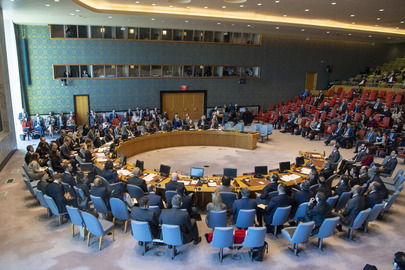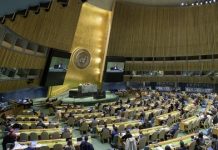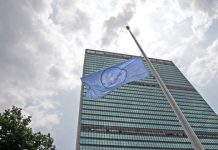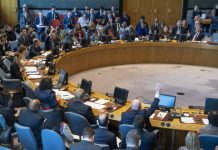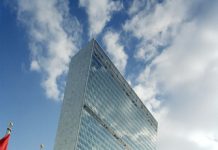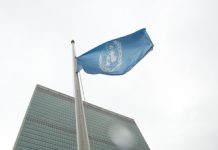“Despite [Israel Defense Forces] demands to move from positions close to the Blue Line, a unanimous decision was taken by all UNIFIL Troop Contributing Countries and the UN Security Council, and our peacekeepers remain deployed in all their positions along the Blue Line,” said Andrea Tenenti, Spokesperson for the UN Interim Force in Lebanon (UNIFIL).
“We need to be here, we need to try to bring back stability and peace to this region,” he told journalists in Geneva.
Safety first
Speaking from Beirut, Mr. Tenenti noted that “hundreds of trajectories and sometimes more” continue to be reported daily by UNIFIL, “forcing our peacekeepers to spend extended hours in shelters to ensure their safety, which remains our top priority”.
He maintained that several incidents in recent days involving the Israeli military that had injured peacekeepers, surveillance cameras and perimeter walls were “of course” a violation of the 2006 UN Security Council resolution that led to the current deployment along a buffer zone. The mission was established in 1978 (read our explainer here).
Resolution 1701 tasks UNIFIL with monitoring the cessation of hostilities following the 2006 war between Israel and Hezbollah, confirming the withdrawal of Israeli forces from southern Lebanon and assisting the Lebanese government in restoring its authority in the area. It counts over 10,000 peacekeepers.
Duty-bound
Highlighting the difficulty of fulfilling its mandate, UNIFIL reported on Friday that “daily heavy shelling has worsened due to Israel Defense Forces incursions into Lebanese territory in the proximity of the Blue Line and in both UNIFIL Sectors (East and West), which constitute a violation of Lebanese sovereignty and also a violation of UN Security Council resolution 1701”.
UN Charter on self-defence
Asked whether peacekeepers can defend themselves if they come under attack, Mr. Tenenti said that under chapter six of the UN Charter, “self-defence can be used, but we also have to be very pragmatic on when to use it and how to use it, because we don’t want to become part of the conflict and use force that would trigger more violence”.
“We’re trying to decrease the tensions, and it’s up to the commanders on the ground to decide when is the time to use self-defence,” he explained.
The UNIFIL spokesperson also said that the mission is “working hard behind the scenes” to coordinate the safe passage of essential humanitarian aid to civilians in south Lebanon, brought in by UN agencies and partners.
“It’s been challenging because most of the times we have not been given the guarantees for safety for humanitarian convoys,” Mr. Tenenti said, limiting the force’s ability to coordinate with humanitarian agencies.
Destruction in the south
Most villages along the Blue Line are “completely destroyed and damaged”, the UNIFIL spokesperson continued. Although some 450,000 people have fled the hostilities, the thousands of others who remain are in desperate need of aid.
Jens Laerke of the UN humanitarian affairs coordination office (OCHA) explained that a humanitarian notification system is “up and running” and that in the south of the country where there is heavy fighting, the system includes informing the Lebanese armed forces and the Israeli Defense Forces of convoy movements.
“That’s where we rely on UNIFIL and their contacts in the area, to make it smooth,” he said.
Source of original article: United Nations (news.un.org). Photo credit: UN. The content of this article does not necessarily reflect the views or opinion of Global Diaspora News (www.globaldiasporanews.net).
To submit your press release: (https://www.globaldiasporanews.com/pr).
To advertise on Global Diaspora News: (www.globaldiasporanews.com/ads).
Sign up to Global Diaspora News newsletter (https://www.globaldiasporanews.com/newsletter/) to start receiving updates and opportunities directly in your email inbox for free.


